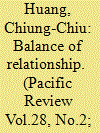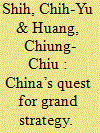|
|
|
Sort Order |
|
|
|
Items / Page
|
|
|
|
|
|
|
| Srl | Item |
| 1 |
ID:
137211


|
|
|
|
|
| Summary/Abstract |
Although many observers in the field of Southeast Asian international relations (IRs) predict that Myanmar's relations with China have faced a grand challenge since the 2010 presidential election, this article provides a different perspective and proposes that Myanmar's China policy remain consistent. In addition, theorists in IRs tend to apply the concepts of balance of power (BoP) and bandwagoning as the analytical base and fail to explain the Southeast Asian states’ responses to the rising China. This article argues that Myanmar's China policy is better understood and depicted by the theory of balance of relationship (BoR). This article further provides an analysis from the angles of historical factor, domestic political tradition, and external environment to investigate Myanmar's manipulation of BoR. The conclusion of this article aims at predicting the future development of the Sino-Burmese relations.
|
|
|
|
|
|
|
|
|
|
|
|
|
|
|
|
| 2 |
ID:
138164


|
|
|
|
|
| Summary/Abstract |
As China’s power steadily rises, mutual role expectations between China and the United States become increasingly unstable. To ensure a mutually agreeable role for China, Chinese grand strategy has the double mission of presenting China as an accepted and respected matching power and of assuring the incumbent hegemonic power that China is a role-player. We apply the notion of national role style to analyse China’s grand strategy. We argue that China adopts the sociological role conception and examines the grand strategy of the rising power accordingly. Through examining China’s policy towards US arms sales to Taiwan, we show how a role-playing China has tried to execute a grand strategy to coach the incumbent hegemonic power into acknowledging China’s rise to the status of a matching power. We argue that the importance of maintaining a stable relationship with the United States has trumped China’s core national interest of unification, pertaining to US arms sales to Taiwan. In practice, China treats arms sales as a bilateral issue, and would rather appeal to sociological role expectations through a bilateral convention than through any general value. The United States, on the other hand, despite its willingness to cope with China in an exclusively bilateral format, has always tried to push China to accept universal rules at the expense of the alleged national differences between the two countries, thereby defeating the sociological role expectation.
|
|
|
|
|
|
|
|
|
|
|
|
|
|
|
|
| 3 |
ID:
185008


|
|
|
|
|
| Summary/Abstract |
China’s Belt and Road Initiative (BRI) has brought opportunities to its neighboring countries in terms of foreign investment and economic development, while at the same time arousing suspicion in the region regarding Beijing’s intentions. This article analyzes Vietnam’s responses to Beijing’s BRI, with a special focus on the psychological mechanism leading to Hanoi’s subtle confrontation of China and mild resistance of the BRI project. The concept of peace efficacy, which is initiated by the theory of the Balance of Relationships (BoR), is proposed in this article to explain the abovementioned case. Meanwhile, Hanoi’s manipulation of two-handed strategies and seeking a balance between Beijing and Taipei are the other focuses of this article. Vietnam’s deeds, once again, reveal its relational confrontation of China. This article further investigates how Vietnam has sophisticatedly redefined and categorized the BRI and utilized Taipei’s New Southbound Policy (NSP) to suit its own interests; through unofficially strengthening its ties with Taipei, Hanoi is able to ease the pressure arising from Beijing’s assertive policy, display its autonomy and prove its equal, independent status in the international arena.
|
|
|
|
|
|
|
|
|
|
|
|
|
|
|
|
| 4 |
ID:
176026


|
|
|
|
|
| Summary/Abstract |
Literature of small state’s foreign policy-making has mostly focused on the structural factors and less on the perceptions of the weak state. This article adopts a cross-level analysis framed by role theory to investigate Vietnam’s China policy. Two role conceptions are provided to illustrate Vietnam’s management of bilateral relations with China. The main demarcation of these two roles lies in their perceptions of hierarchy embedded in the asymmetric relations. The independent role is ego-driven and identity based that it views hierarchy as mainly the discrepancy of material power. By contrast, the interactive role is relational oriented and interprets hierarchy from the angle of distribution of responsibilities; the higher role expectation of the other actor and the pursuit of relational security are especially emphasized by this interactive role. Finally, this article utilizes the case of South China Sea dispute to explain how and why inter-role conflict and domestic role contestation occurred.
|
|
|
|
|
|
|
|
|
|
|
|
|
|
|
|
| 5 |
ID:
173185


|
|
|
| 6 |
ID:
177631


|
|
|
|
|
| Summary/Abstract |
How the small states bordering China study their giant neighbor and how they develop the discipline that brought crucial impacts to their China policies have been ignored by scholars in social sciences and area studies. This article focuses on Vietnam, a nation that has developed its own special characteristics of Sinology because of the country's distinctive historical experience and close ties with China. This study introduces the different but equally remarkable training styles of Vietnamese sinologists through two analytical threads, namely, systematic training and cultural heritage. In addition to presenting the cases of Vietnamese Sinology, this study also compares the cases of Sinological developments in other East Asian countries. Through investigation and comparison, the current research is optimistic that it can show how and why Vietnamese Sinology has maintained its richness and diversity despite the domestic and international political upheavals that this field has encountered. This research further argues that the diverse resources accumulated in the evolution of north and south Sinology enable Vietnam to maintain flexibility when interacting with China.
|
|
|
|
|
|
|
|
|
|
|
|
|
|
|
|
|
|
|
|
|